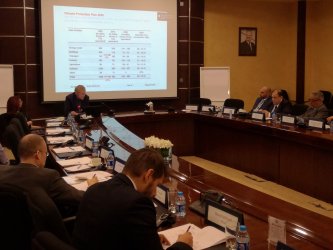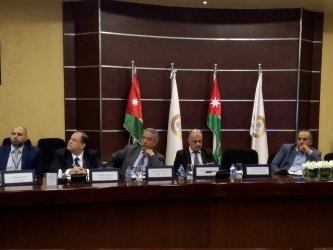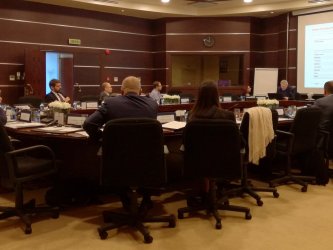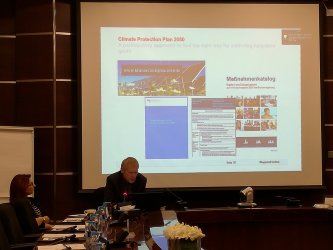-
Affordable and Clean Energy for All in Jordan
Affordable and Clean Energy for All in Jordan
On May 16, the West Asia - North Africa Institute (WANA) and Friedrich-Ebert-Stiftung (FES) hosted a ministerial meeting on Sustainable Development Goal 7: Affordable and Clean Energy for All. Participants discussed the challenges and opportunities of implementing SDG 7 in Jordan.
The meeting was attended by key stakeholders from several ministries and the energy sector. The outcomes of the meeting will be published as guidance notes later this year.
Energy Essential for All Human Well-being
Energy is fundamental to all Sustainable Development Goals and central to development, security and climate change challenges. Access to energy underpins all aspects of human well-being, be it health, education, food production, transportation or communication.
In order to achieve SDG 7, the gap between policy and practice should be bridged. Promoting local green financing, enhancing building compliance codes, and creating synergies between stakeholders are key in developing a better implementation plan for Jordan.
Implementing SDG 7 will also help to achieve the goals of the Paris Agreement, which calls on countries to keep global temperatures from rising above 2°C this century, hoping to further push for 1.5°C.
Professor Dr Manfred Fischedick, Vice President of the Wuppertal Institute, discussed Germany’s experience in implementing SDG 7. “The sustainable transition of the energy system is strongly related to climate change and provides multiple co-benefits in relation to the SDGs,” he said. “Such a transition is more than a pure technological challenge and requires an integrated assessment of technological options with regard to impacts on the sustainable development. Only if such positive impacts are experienced, the acceptance of energy transition pathways is given.”
“Energy is probably the most important cross-cutting topic,” Richard Probst, Regional Coordinator of FES, added. “However, we should not single it out, but rather understand energy also from a water perspective, and to see its implications for the fight against climate change.”
Solar and Wind Energy: Jordan’s Way Forward?
Jordan is one of the few energy resource-poor countries in West Asia. It does, however, enjoy quality solar and wind energy. With wind speeds reaching between 7.5 to 11.5 m/s in some places, wind projects are not only feasible, but competitive. The high solar radiation of 5 – 7 kWh/m2 per day with about 300 sunny days per year makes solar energy Jordan’s most promising future renewable energy source, according to EDAMA.
Several projects in Jordan are building capacity in an effort to make solar and wind power account for 10% of the country’s primary energy mix by 2020. This goal can be achieved if businesses help accelerate the transition to an affordable, reliable and sustainable energy system by investing in renewable energy resources.
Pathways Towards the Sustainable Development Goals: Jordan and Beyond
The WANA Institute and FES want to demystify the environmental SDG process in Jordan and provide guidance on how to tackle the challenges associated with inter-sectorial goals through their project ‘Pathways Towards the Sustainable Development Goals: Jordan and Beyond’. The project commenced with a regional conference in April 2017, which will be followed-up with a series of strategy meetings.
In the opening remarks, Maysoon Zoubi, Academic Advisory Board Member of the WANA Institute, specified that “while the SDGs are of equal importance, this project focuses on three goals that speak directly to pressing challenges in Jordan’s environmental development, namely SDG 6: Ensure access to water and sanitation for all, SDG 7: Ensure access to affordable, reliable, sustainable and modern energy for all, and SDG 13: Take urgent action to combat climate change and its impacts.”
“Working on all these SDGs together and stimulating a debate in Jordan about it, is the ambition of the joint project between FES and WANA,” Richard Probst concluded.




